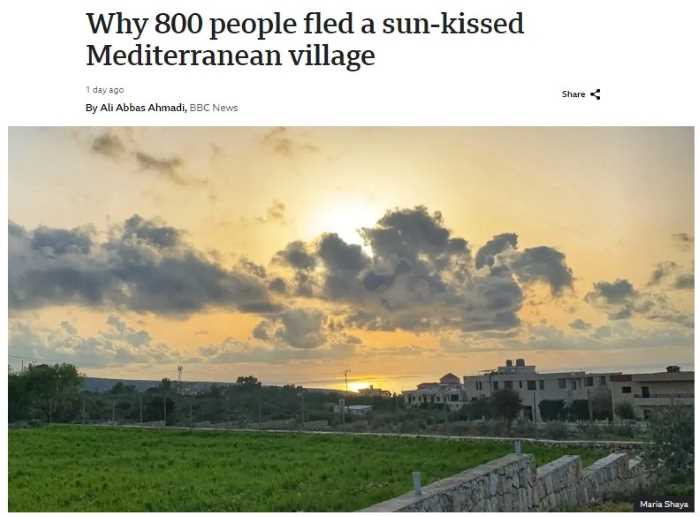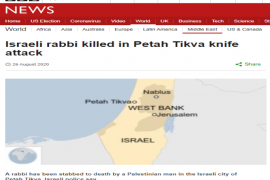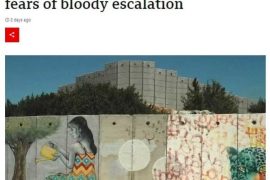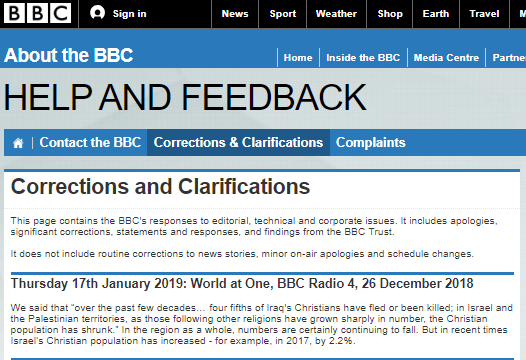Readers may recall that a month and a half ago the BBC News website published a report by a Beirut-based BBC Arabic correspondent about her UNIFIL-escorted trip to two villages in southern Lebanon:
BBC REPORT FROM SOUTH LEBANON IGNORES UNSC RESOLUTION 1701
One of the villages featured in that report is called Alma el Shaab (also Alma al Shaab or Alma el Chaab) and it is also the focus of another BBC News website report published on June 16th under the headline “Why 800 people fled a sun-kissed Mediterranean village”.
That report (which was also translated into at least one other language) is credited to Ali Abbas Ahmadi who joined the BBC about a year ago and – as stated in his Twitter bio – previously worked for the Qatari media outlet ‘The New Arab’, founded by former Balad MK Azmi Bishara who fled Israel in 2007 after having been charged with treason.
Ahmadi’s report opens as follows: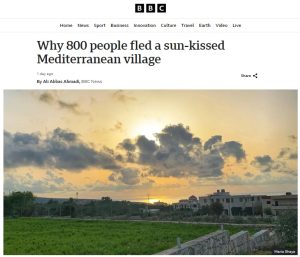
‘”Why, why us?” cries Milad Eid, his anguish clear over the breaking phone line.
An hour earlier, he was dousing a fire at a house that had been hit by an Israeli missile. While he was there, a bomb struck another one.
His village, Alma al-Shaab, lies in southern Lebanon just over a kilometre from the Israeli border.
Since October last year, it has been caught in cross-border fighting between Israeli forces and Hezbollah, the Shia Muslim organisation which is politically influential and in control of the most powerful armed force in Lebanon.
At least 800 residents have fled the village, and now there are only about 100 left, officials say.
“Nobody knows why they are attacking our houses,” Mr Eid says. “It’s not our war.”’
Ahmadi could have easily answered that “why us?” question by informing his readers of the eighteen-year-long failure to enforce the terms of UN Security Council resolution 1701 but – like so many other BBC journalists – he avoids that obviously relevant topic completely.
Ahmadi makes no effort to explain that according to that resolution, the terrorist organisation (rather than “Shia Muslim organisation”) Hizballah is barred from maintaining a military presence south of the Litani river (some 30 kms north of the border with Israel) and that the UN force charged with enforcing that resolution – UNIFIL – has failed to do so.
Ahmadi continues:
“One of the Christian villages in the largely Shia-Muslim south, Alma al-Shaab’s position on a hill offers majestic views of the surrounding countryside, all the way to the sea in the distance.
It is also clearly visible from northern Israel.
This closeness to the border has seen it heavily targeted by Israeli forces over the past nine months.”
Military operations in the vicinity of Alma al Shaab of course have nothing to do with its “closeness to the border” or the fact that it is “visible from northern Israel”. Such operations are exclusively down to the fact that Lebanon-based terrorists including Hizballah have used that location as a site from which to launch attacks on Israel.
Only five paragraphs later does Ahmadi tell his readers that:
“The Israeli army says it targets Hezbollah fighters and infrastructure and retaliates to attacks on Israeli army bases in northern Israel.”
However, he then goes on to promote a completely unevidenced allegation made by Lebanese politicians which also appeared in the report published a month and a half earlier.
“But some top Lebanese officials have accused it of implementing scorched earth tactics to make the whole area uninhabitable.”
Readers have to reach paragraph eighteen of Ahmadi’s report before they are told that:
“The villagers the BBC spoke to were reluctant to discuss whether Hezbollah or other armed groups were using Alma al-Shaab to attack Israel. One hinted that locals had unsuccessfully tried to stop fighters from using their land.”
Readers also find the following:
“By the end of May, Alma al-Shaab had been hit 188 times by Israeli forces, according to the Beirut Urban Lab, a research centre that uses data from the Armed Conflict Location & Event Data Project (Acled).”
That link to the ‘Beirut Urban Lab’ takes BBC audiences to a webpage which includes statements and links that should raise the eyebrows of any journalist committed to standards of accuracy and impartiality:
“Since October 7, the Middle East has occupied center stage in global media attention. Already rife with uncertainty, subjected to episodic bouts of violence, and severely affected by an ongoing project of ethnic cleansing for 75 years in Historic Palestine, our region is again bearing the weight of global, regional, and local violence.
As we witness genocide unfolding and forceful population transfers in Gaza, along with an intensification of settler attacks in the West Bank and Jerusalem and the silencing of Palestinians everywhere, the conflict is also taking critical regional dimensions.” [emphasis added]
Those overtly politicised statements perhaps become more comprehensible when one appreciates that during the war initiated by Hizballah in 2006, the ‘Beirut Urban Lab’ – run by staff at the American University of Beirut – collaborated with the ‘media team’ of a Hizballah approved self-described “marginal radical left” organisation called ‘Samidoun’ (not connected to the PFLP linked NGO of the same name) in order to produce “daily maps of the Israeli assault on Lebanon”.
Ahmadi also fails to tell his readers that ACLED data is sourced from local partners including anonymous sources.
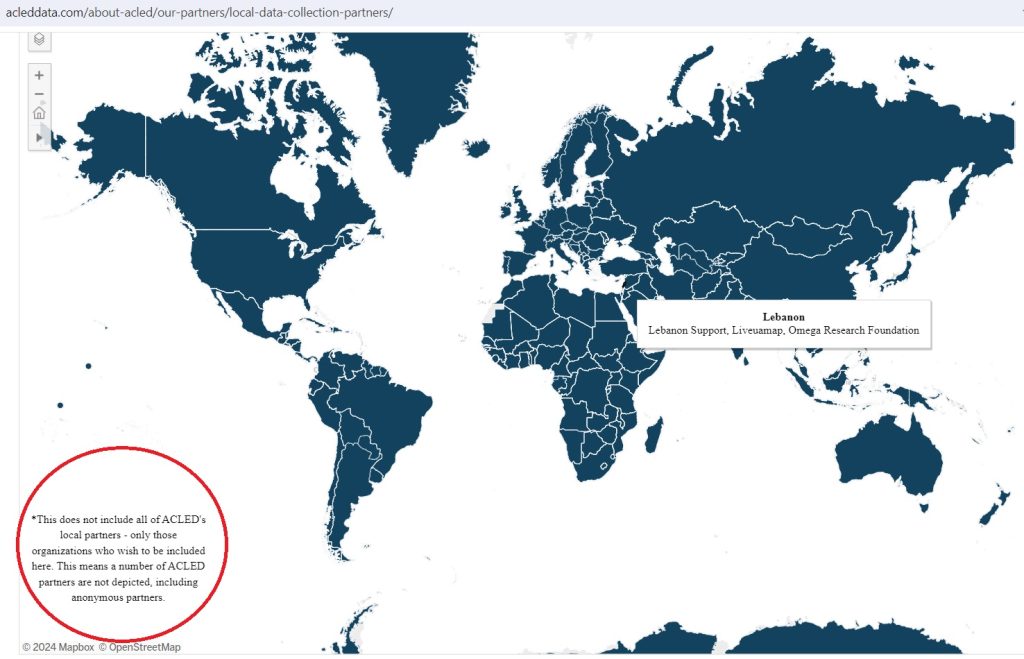
Towards the end of Ahmadi’s report readers find the following:
“Some residents insist they will stay, no matter what.
Milad Eid is one of them. “You don’t know when the clouds will shell you or something will attack you,” he says.
But if he leaves, he is afraid of “facing the same problem as the Palestinians when they left their country”.
Mr Eid is referring to what is known as the Nakba, or Catastrophe, by the Palestinians.
On 14 May 1948, Israel declared independence, and in a war which began the next day, up to 750,000 Palestinians who had lived on that land fled or were expelled from their homes.
Neither they nor their descendants have been allowed by Israel to return.
“They became refugees, and still after 70 or 75 years they are crying for their country and their villages and their houses,” he says.”
Those highlighted paragraphs are taken from the problematic 2018 BBC backgrounder to which the link leads. As we noted when the same wording appeared in another BBC report published in May, it fails to clarify that the war was the result of the attempt by multiple Arab countries to invade and destroy the newly declared Jewish state and that the displacement of Palestinians did not begin only after Israel declared independence on May 14th 1948. In fact, by that date, roughly half of those who became refugees had already fled, in many cases due to instruction from their leaders.”
For at least the third time since Hizballah attacked Israel on October 8th , we see that BBC reporting from southern Lebanon fails to provide the full picture. As we have noted in the past, audiences cannot fully comprehend why civilians have had to leave their homes in southern Lebanon (and northern Israel) without the necessary understanding of how the failure to implement UNSC resolution 1701 led to the current situation. Nevertheless, the corporation’s journalists continue to serially erase that all-important topic from their reporting, thereby denying BBC audiences essential information.
Related Articles:
BBC NEWS RECYCLES ONE-SIDED NAKBA BACKGROUNDER
BBC NEWS ONCE AGAIN ERASES UNSC RESOLUTION 1701 FROM A LEBANON STORY

